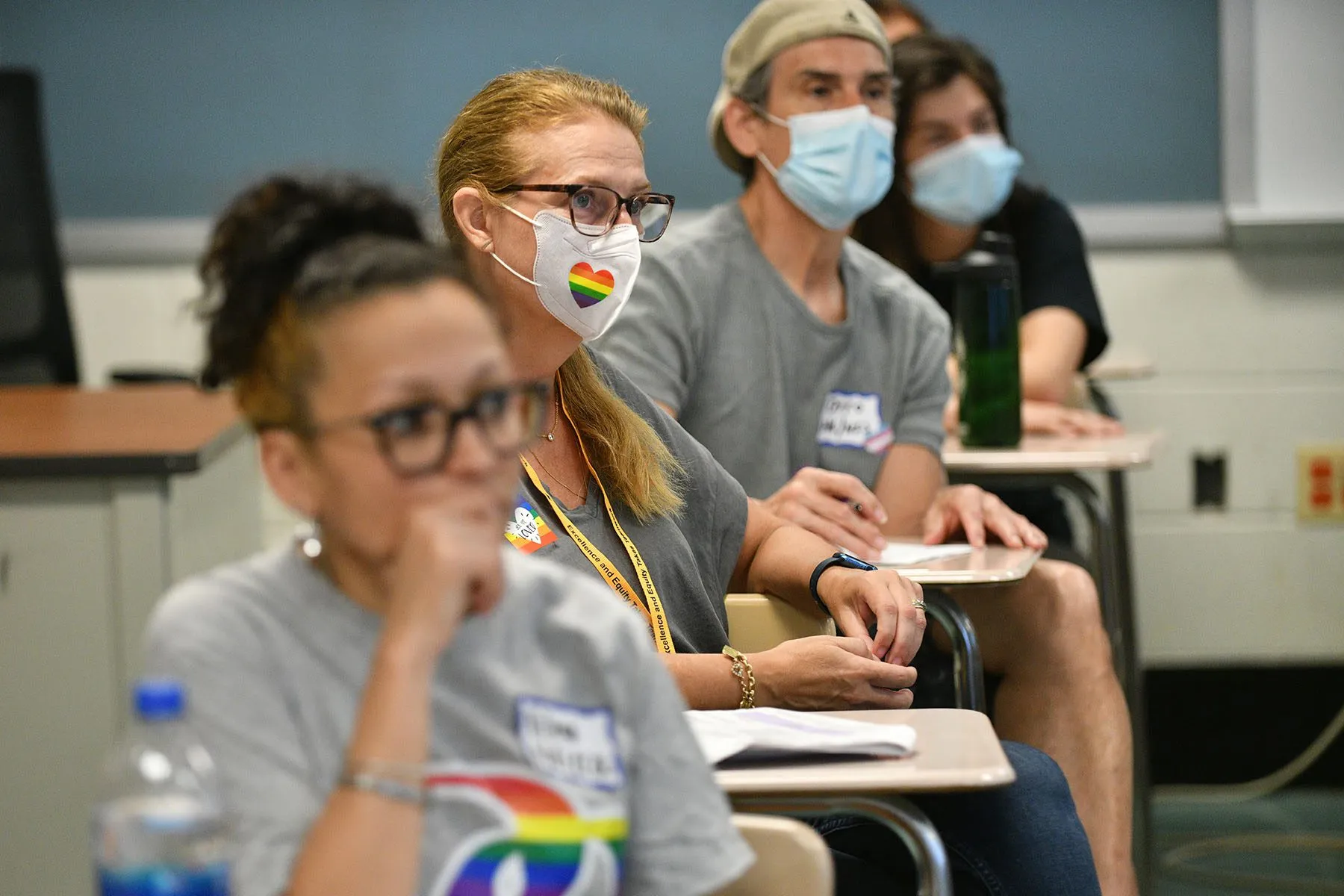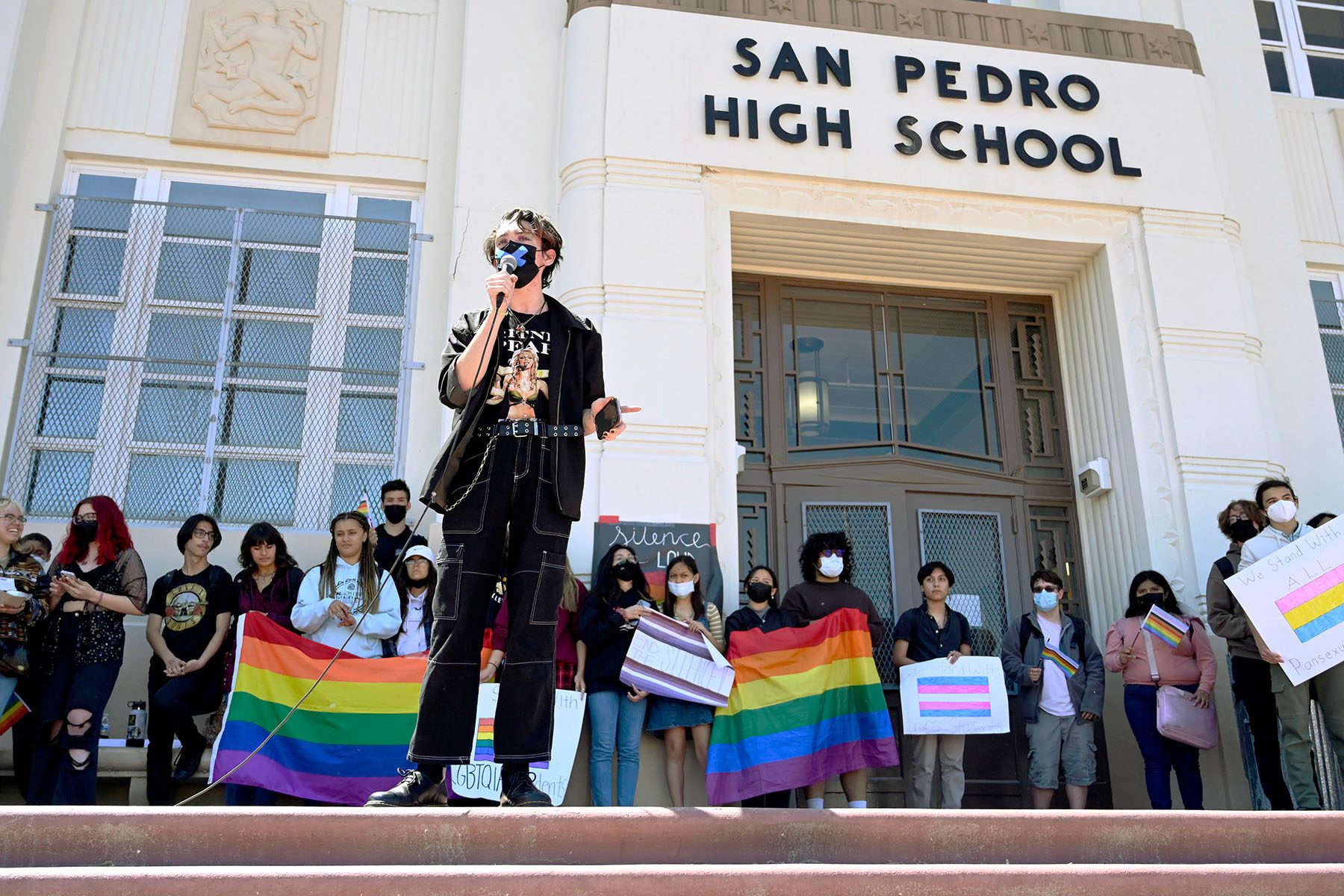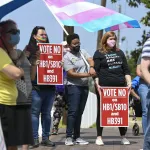As an openly gay high school student in Long Beach, California, 12 years ago, Christopher Covington desperately sought the support of an adult ally. He wanted someone who was willing to take the time to find out why he disrupted class and mouthed off to teachers, resulting in multiple suspensions. Instead, Covington said, educators viewed him as a troublemaker and misfit who needed to be disciplined.
“So the easiest thing for the school site to do was to refer me over to [an alternative] continuation high school,” said Covington. “Instead of asking: ‘How did you get to this place? Is there anything happening in your life that you need support around?’ It’s very easy for teachers just to suspend, refer, discipline and get the students out of the class.”
Openly LGBTQ+ students like Covington disproportionately face discipline in schools, often for reasons related to their sexual orientation or gender identity, researchers and experts say. That discipline can carry dire consequences that follow them for years to come.
Although about 10 percent of youth between the ages of 13 and 17 identify as LGBTQ+, 33 percent of queer students report experiencing school discipline of some sort, including principal’s office visits, detention, suspension or expulsion.
LBGTQ+ students, particularly gender-nonconforming youth, experience disciplinary action for reasons such as violating dress codes, showing affection to their romantic partners or simply advocating for themselves, research shows. Giving educators professional development and making school policies more equitable for all students can counter the problem.
Research from GLSEN, which advocates for LGBTQ+ students in K-12 schools, indicates that queer youth commonly navigate hostile school environments. Fifty-nine percent of students GLSEN surveyed for its 2019 National School Climate Survey, the most recent data it has published on the issue, reported encountering discriminatory policies or practices at school. More than 18 percent of survey respondents said they were prevented from wearing clothes considered “inappropriate” for their gender. Twenty-eight percent said they were disciplined for engaging in public displays of affection for which non-LGBTQ students were not punished. Nearly 23 percent said they were prevented from using their chosen names/pronouns. About 17 percent said they were prohibited from discussing or writing about LGBTQ+ topics in school assignments, and 3 percent said they were disciplined for simply identifying as LGBTQ+.
-
More LGBTQ+ coverage
- These companies publicly oppose anti-LGBTQ+ bills. Some also fund lawmakers who sponsor them.
- ‘I realized that I don’t want to die’: LGBTQ+ people share stories of hope after suicidal ideation
- As Pride month closes, LGBTQ+ advocates are split on whether Biden is doing enough to protect the community
Covington suspects that identifying as gay when he was in high school contributed to educators ultimately referring him to an alternative school. They are also multiracial, and race is an additional risk factor for suspension. The 19th previously reported that research from the African American Policy Forum’s Black Girls Matter report shows that Black girls are suspended six to seven times as often as White girls, and Black boys are suspended three times as often as White boys.
“My personal take and my professional take on why LGBTQ students are currently being negatively affected in regards to disciplinary policies on campus is because the teachers just don’t know what to do with LGBTQ students,” said Covington, who is a statewide lead organizer for the Genders & Sexualities Alliances (GSA) Network, made up of student-run clubs for LGBTQ+ and allied youth.
Emily Greytak, director of research for the ACLU, said that professional development is critical for educators. Far too few teachers receive training about how to make the school environment inclusive for LGBTQ+ youth and how to respond when these youth are struggling, she said. When teachers do have this training, they are more likely to better support LGBTQ+ students.
And school leadership has a key part to play.
“In terms of setting the tone, that can be huge because no matter what policies you have, what training you have, educators and school personnel know if the principal isn’t proactively being clear that discrimination against LGBTQ+ youth or anyone is not tolerated and is able to say that upfront,” she said.
Greytak added that it makes a difference when principals stress the importance of using the correct pronouns for students or state that there will be consequences for intentionally misgendering youth. When principals set firm boundaries, their faculty members tend to follow, she said.
Ill-equipped educators may directly contribute to the discipline of LGBTQ+ students, pushing them out of class, said Caitlin Clark, a researcher with GLSEN’s Research Institute, which conducts original research on LGBTQ+ issues in K-12 education. LGBTQ+ youth “are often in conflict in school,” Clark said.

“There’s physical altercations where they are being victimized for their sexual orientation or gender identity, but in schools with zero-tolerance policies or at any school where a teacher isn’t well trained on LGBTQ issues or intervention, both students often end up being disciplined or receiving some kind of detention or suspension for being involved in a physical altercation,” Clark said. Meting out punishment in this way ignores the discriminstation the LGBTQ+ student has faced and results in victimized youth being disciplined.
About 69 percent of LGBTQ+ students in the United States have experienced verbal harassment at school, more than a quarter have been physically harassed, 58 percent have been sexually harassed, and 11 percent have been physically assaulted, according to GLSEN’s 2019 National School Climate Survey. More than half of these students said they did not report these incidents to adults on campus, and 60 percent of those who did said school staff did nothing in response or told students to ignore the harassment or misconduct.
“About half of those students say that the reason they don’t report [abuse and harassment] to their teachers is because they’re afraid that reporting that they’re being harassed or assaulted is actually going to result in them being disciplined,” Clark said. “That is like a huge amount of students to say, ‘I don’t want to tell my teachers, who might be able to help me, because I’m afraid that that will result in me getting in trouble.’”
Greytak emphasized that LGBTQ+ youth are not a monolith and therefore experience discipline at different levels and for different reasons. LGBTQ+ students who belong to marginalized racial groups, have disabilities or who experience housing insecurity tend to face more school discipline than their peers who don’t face overlapping forms of oppression. Moreover, transgender and gender-nonconforming youth typically face more conflict in schools than their cisgender counterparts.
A January 2022 study published in the Journal of Research on Adolescence found that Black LGBT youth were three times more likely to be suspended than their White LGBT peers and seven times more likely to be suspended than White non-LGBT youth. With the exception of Asian LGBT youth, all LGBT youth of color had higher suspension rates than their White LGBT counterparts. The study authors suggest that schools adopt supportive strategies, including alternatives to punitive discipline, to lower odds of suspension. The study used LGBT in describing the youth.
Greytak recommends that schools amend policies that discriminate against LGBTQ+ youth and adopt anti-bullying and harassment policies that address mistreatment of this student population and other marginalized students.
“But students and their parents need to be made aware of the policy,” she said. “And, most importantly, educators need to be aware and trained on the policies and procedures for how to handle that.”
Left unaddressed, discriminatory school policies and punitive discipline can have long-lasting consequences for youth, leading to increased truancy and dropout rates, which make it more likely that students will enter the criminal justice system.
“Because LGBTQ students face high rates of victimization based on their identity, they feel unsafe at school, and this feeling of unsafety leads to higher rates of absenteeism,” Clark said. “That also then feeds into this cycle of discipline. If you’re missing school, many schools will then discipline students for poor attendance. But these students aren’t skipping school because they feel like going home. They’re missing school because it’s not a place where they feel safe.”
Many schools are unaware of the toll school discipline policies have on LGBTQ+ youth. Due to privacy concerns, schools don’t collect demographic data about LGBTQ+ youth in the same way they gather information about race, income or disability status. Anonymous surveys of students can protect the privacy of LGBTQ+ youth while giving schools a better idea of what the school climate is like for this population and other marginalized groups, experts told The 19th.
“We really recommend that schools survey their student body anonymously to get information on all types of experiences, not just negative, but positive and not just around LGBTQ, but all different identities,” Greytak said.
While inclusive school policies, professional development and decisive leadership may help lower suspension rates of LGBTQ+ students, Covington said that fostering positive relationships between students and staff is imperative. But that can only happen if schools receive more resources, including more teachers, smaller class sizes and wraparound services on campuses. During a national educator shortage when teachers are overwhelmed and under-resourced, making these changes will likely be a challenge.
Still, Covington stressed that when LGBTQ+ students feel they have the support of adult allies, they are more likely to attend and graduate from school and less likely to experience anxiety and suicidal ideation. The Trevor Project found in 2019 that LGBTQ+ youth who have at least one accepting adult in their lives were 40 percent less likely to attempt suicide.
“I, personally, was going through a lot of things at home,” Covington said of his teen years. “I needed therapy. I needed an outlet, and I needed safe and supportive adult allies on campus to recognize that I was a student in need versus identifying me as a troublemaker or as someone who doesn’t belong on the campus or is not worthy enough to save and support.”







